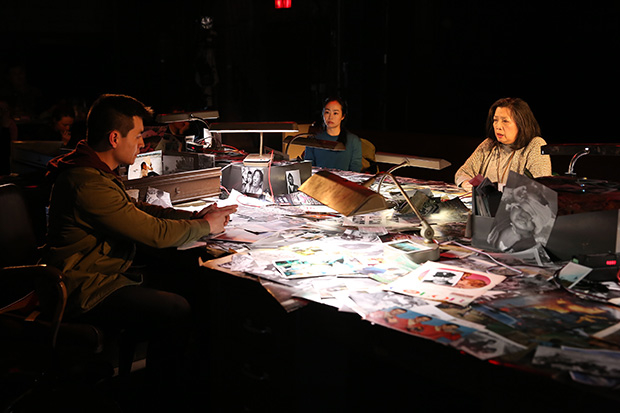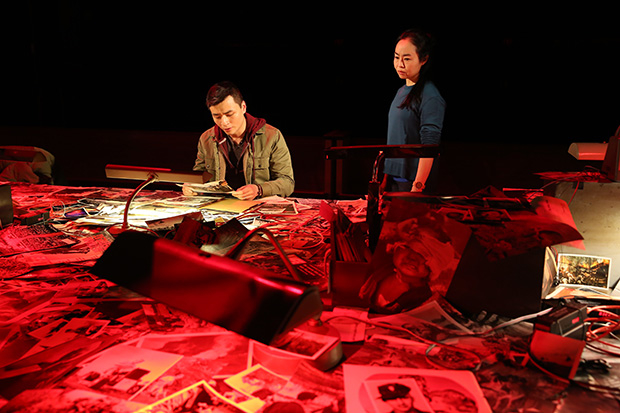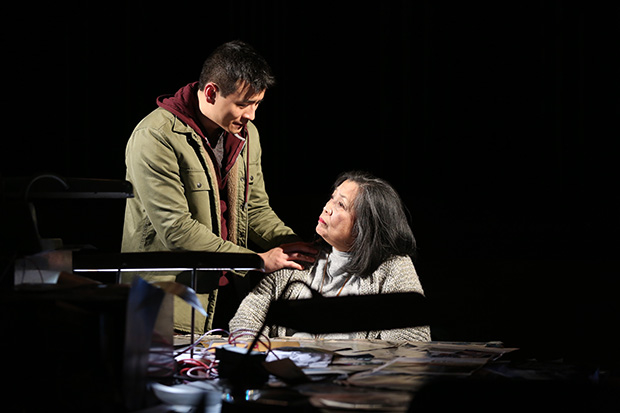The Trial of the Catonsville Nine, When America Jailed Priests for Protesting War
An off-Broadway revival of Father Daniel Berrigan’s play summons the ghosts of civil disobedience past.

(© Carol Rosegg)
When imagining resistance to the Vietnam War, Americans are likely to think of daisy-clutching hippies led by a riled-up Abbie Hoffman — but that's not the full picture. Playwright Daniel Berrigan showcases an entirely different kind of peacenik in The Trial of the Catonsville Nine, now receiving a revival with Transport Group and the National Asian American Theatre Company at the Abrons Arts Center. A Jesuit priest, Berrigan was one of nine activists (half of whom were also members of the clergy) who stormed the Selective Service office in Catonsville, Maryland, on May 17, 1968. They carried off 378 draft records, which they promptly burned with napalm in the parking lot. To the nine, this was 378 lives saved from war; but to the United States, it was criminal destruction of government property. This blistering revival shines an interrogator's light into the gap between justice and the law, asking us if we're brave enough to live in that protean space.
Berrigan, who died in 2016 and who spent much of his life being hauled into court for civil disobedience, was certainly brave enough. He wrote The Trial of the Catonsville Nine using actual transcripts from the trial that convicted him of mutilating federal records. The play made its world premiere in 1971 (while Berrigan was still in prison) before transferring to Broadway for a monthlong run.

(© Carol Rosegg)
For this revival, director Jack Cummings III has adapted the script to be performed by just three actors (down from the 16 suggested in the published edition). Entering from the empty house of the theater, David Huynh, Mia Katigbak, and Eunice Wong gingerly approach the stage (where we are seated in a rectangle). Like bookish tomb raiders discovering a hidden room, they immediately home in on the treasure trove of documents and photographs splayed on the central island of pushed-together metal desks (evocative set design by Peiyi Wong). Over the course of 85 minutes, they portray everyone involved in the trial (the witnesses, defendants, prosecution, and judge), occasionally swapping roles with seamless fluidity. It's a testament to both Cummings's steady directorial hand and the uniformly strong performances of the cast that it is always crystal-clear who is speaking, and about what.
We learn how Thomas and Marjorie Melville became involved in the antiwar movement after doing missionary work in Guatemala and seeing how the United States government engaged in political violence against suspected leftists there. Mary Moylan took a very similar path to antiwar activism, but through Uganda. "Our foreign policy is indeed a reflection of our domestic policy," she observes after noting the similarity between military violence in Africa and police violence in Washington, DC. The judge and prosecutor repeatedly remind the defendants that the US government is not on trial, which, after hearing about all the criminal activity it is perpetrating, raises the question, Why not?

(© Carol Rosegg)
Sound designer Fan Zhang gives us a couple of minutes to contemplate that question. After a particularly dramatic confrontation between the prosecutor and defendant George Mische, Huynh places a record on the turntable resting on the corner desk, and we all listen to Rosemary Clooney's rendition of "Look to the Rainbow" as we process what we've just seen. The actors retreat to quiet corners on the set to do the same. The moment comes as blessed relief.
In design and staging, Cummings uses the old Neighborhood Playhouse stage in unexpected and exciting ways: When the jury goes into deliberation, the heavy metal garage door at the back of the stage clangs shut as the curtain falls at the lip of the stage, closing us in. As the defendants confront the judge in his chambers, we can feel the heat of the blinding stage lights above us. Minutes later, we can smell something burning, conjuring just a fraction of the unpleasant scent that must accompany burning flesh (intense, somewhat scary lighting from R. Lee Kennedy). And why shouldn't we be forced to smell it? As US taxpayers, we're funding it.
With searing moral clarity as powerful as it must have been in 1971, The Trial of the Catonsville Nine challenges us to reassess our responsibility as citizens. It's not enough just to vote and post our opinions to Facebook. Sometimes, being a good citizen also means breaking the law.







